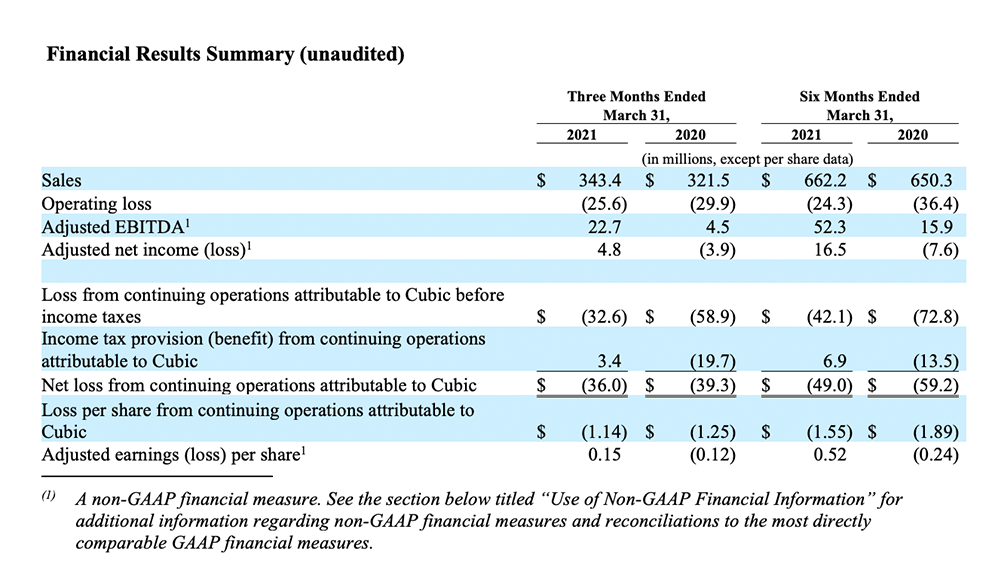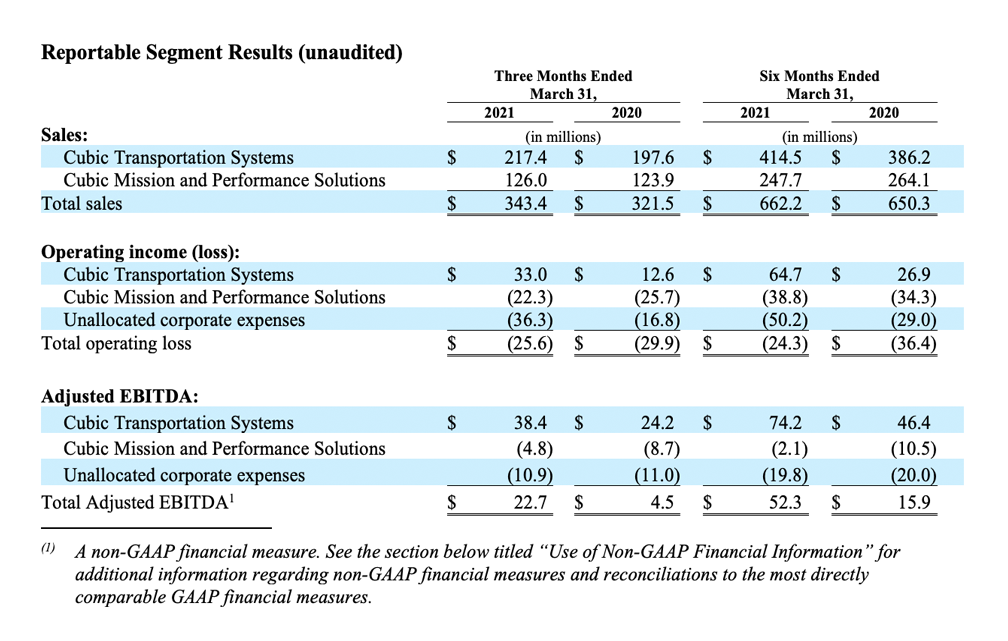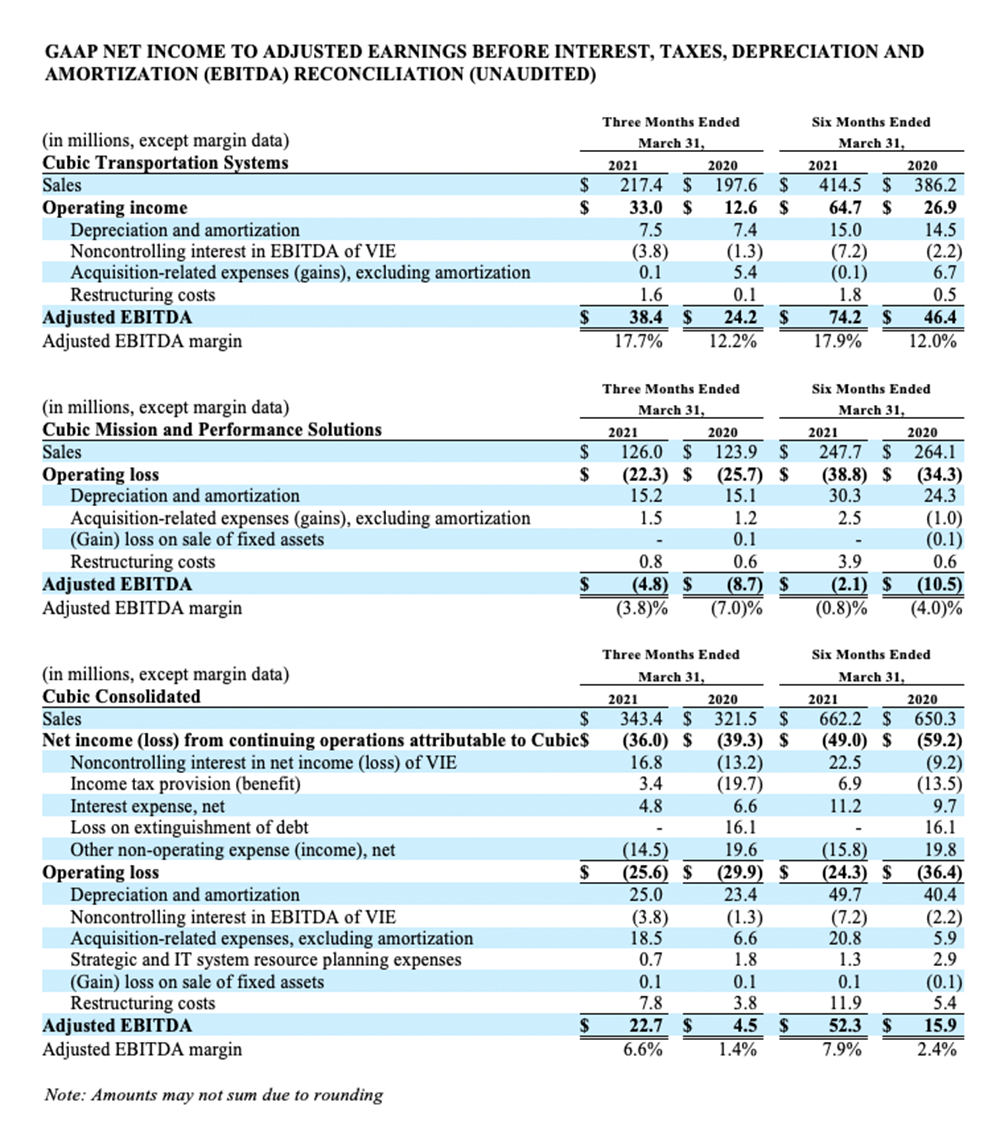SAN DIEGO – May 5, 2021 – Cubic Corporation (NYSE: CUB) (“Cubic” or the “Company”) today announced its financial results for the second fiscal quarter ended March 31, 2021.
In light of the pending acquisition of Cubic by Veritas Capital and Evergreen Coast Capital Corporation, the Company will not be hosting a conference call to discuss its financial results. The pending acquisition remains subject to the receipt of certain regulatory approvals and the satisfaction of other closing conditions. Cubic currently anticipates that the pending acquisition will be completed during the second calendar quarter of 2021.
Second Quarter Fiscal 2021 Highlights
- Sales of $343.4 million, increased 7% year-over-year
- Net loss from continuing operations attributable to Cubic of $36.0 million, or $1.14 per share, compared to $39.3 million, or $1.25 per share, in the second quarter of the fiscal year ended September 30, 2020 (“fiscal 2020”)
- Adjusted earnings per share (“EPS”) of $0.15, compared to a loss of $0.12 per share in the second quarter of fiscal 2020
- Adjusted EBITDA of $22.7 million, compared to $4.5 million in the second quarter of fiscal 2020
“We delivered solid growth in Sales, Adjusted EBITDA and Adjusted EPS in the second quarter of fiscal 2021,” said Bradley H. Feldmann, chairman, president and chief executive officer of Cubic. “We continue to make great progress on our NextCUBIC strategy, which is driving innovation and sustainable value for our customers, employees and communities.”
Consolidated Second Quarter Fiscal 2021 Results
(all metrics compared to Second Quarter Fiscal 2020 unless otherwise noted)
Sales increased 7% as reported (4% on a constant currency basis) to $343.4 million, compared to $321.5 million in the prior year period, driven by strong growth in Transportation Systems.
Operating loss was $25.6 million, compared to $29.9 million in the prior year period. Results benefited from an increase in operating income in Transportation Systems and a decrease in operating loss in Mission and Performance Solutions. Unallocated corporate and other costs increased to $36.3 million compared to $16.8 million in the prior year period driven by costs incurred in connection with our evaluation of proposals to acquire Cubic and higher restructuring costs in connection with NextCUBIC transformation and cost optimization initiatives.
Adjusted EBITDA increased to $22.7 million, compared to $4.5 million in the prior year period. Adjusted EBITDA margin increased approximately 520 basis points to 6.6%.
Net loss from continuing operations attributable to Cubic was $36.0 million, or $1.14 per share, compared to $39.3 million, or $1.25 per share, in the prior year period. Adjusted net income was $4.8 million, or $0.15 per share, compared to a loss of $3.9 million, or $0.12 per share, in the prior year period.
Net cash used by continuing operations was $36.4 million, including the impact of consolidating the Company’s Boston variable interest entity (“VIE”), compared to $26.5 million in the prior year period. Adjusted Free Cash Flow was negative $33.9 million, compared to negative $37.0 million in the prior year period.
Cubic Transportation Systems (“CTS”)
CTS sales increased 10% as reported (6% on a constant currency basis) to $217.4 million, compared to $197.6 million in the prior year period, driven by U.S. system development contracts.
CTS Adjusted EBITDA increased 59% to $38.4 million, compared to $24.2 million in the prior year period. Adjusted EBITDA margin of 17.7% increased 550 basis points, compared to the prior year period, reflecting strong project execution and the impact of NextCUBIC cost savings initiatives.
Cubic Defense
Cubic Defense sales increased 2% as reported (flat on a constant currency basis) to $126.0 million, compared to $123.9 million in the prior year period. Sales reflected an increase in sales generated by C2ISR and expeditionary satellite communications products (GATR), primarily offset by lower sales from the live, virtual and constructive (LVC) training business.
Cubic Defense Adjusted EBITDA improved to negative $4.8 million, compared to negative $8.7 million in the prior year period. Adjusted EBITDA margin improved to negative 3.8%, compared to negative 7.0% in the prior year period, reflecting sales mix as well as lower selling, general and administrative expense as a result of cost savings initiatives, partially offset by higher research and development expense.
Backlog
Backlog decreased by $40.6 million from September 30, 2020 to March 31, 2021. Foreign currency had a favorable impact of $71.8 million during the period.
Key Orders: Second Quarter Fiscal 2021
- $23 million to provide road tunnel outstation maintenance for Transport for London
- $13 million to provide IT network and infrastructure upgrades for the Port Authority Trans-Hudson (PATH)
- $10 million to provide next-generation readers to Bay Area Rapid Transit (BART) and Muni Clipper 2.0
Cubic Defense
- $57 million in combined orders to provide expeditionary satellite communications products for the United States Army
- $32 million Unified Video Dissemination System enterprise license renewal with government customer
- $26 million first delivery order under Cubic’s sole vendor Sailor 2025 Ready Relevant Learning indefinite delivery/indefinite quantity contacts
- Cubic Nuvotronics awarded a contract worth more than $10 million to support Department of Defense “5G to Next G” program
Balance Sheet
Cubic’s bank net leverage ratio, as defined in the Company’s credit agreement, was 3.5x at the end of the second quarter of our fiscal year ended March 31,2021. The credit agreement allows for net leverage of up to 4.0x.
About Cubic Corporation
Cubic is a technology-driven, market-leading provider of integrated solutions that increase situational understanding for transportation, defense C4ISR and training customers worldwide to decrease urban congestion and improve the militaries’ effectiveness and operational readiness. Our teams innovate to make a positive difference in people’s lives. We simplify their daily journeys. We promote mission success and safety for those who serve their nation. For more information about Cubic, please visit www.cubic.com or on Twitter @CubicCorp.
Investor Contact
Kirsten Nielsen
Investor Relations
Cubic Corporation
Kirsten.Nielsen@cubic.com
Media Contact
Christina Itzkowitz
Corporate Communications
Cubic Corporation
Christina.Itzkowitz@cubic.com
Forward-Looking Statements
This press release contains forward-looking statements within the meaning of the Private Securities Litigation Reform Act of 1995 (the “Act”) that are subject to the safe harbor created by the Act. Forward-looking statements include, among others, statements about Cubic’s expectations regarding future events or its future financial and operating performance and delivering on its strategic growth plan. These statements are often, but not always, made through the use of words or phrases such as “may,” “will,” “anticipate,” “estimate,” “plan,” “project,” “continuing,” “ongoing,” “expect,” “believe,” “intend,” “predict,” “potential,” “opportunity” and similar words or phrases or the negatives of these words or phrases. These statements involve risks, estimates, assumptions and uncertainties that could cause actual results to differ materially from those expressed in these statements, including, among others: the pending acquisition of Cubic by Veritas Capital and Evergreen Coast Capital Corporation; the impact of the COVID-19 outbreak or future epidemics or pandemics on Cubic’s business, financial condition and operating results; Cubic’s dependence on U.S. and foreign government contracts; delays in approving U.S. and foreign government budgets and cuts in U.S. and foreign government defense expenditures; the ability of certain government agencies to unilaterally terminate or modify Cubic’s contracts with them; Cubic’s assumptions covering behavior by public transit authorities; Cubic’s ability to successfully integrate recently acquired companies, including Trafficware, GRIDSMART, Nuvotronics, Delerrok and PIXIA, into its business and to properly assess the effects of such integration on its financial condition and operating results; the U.S. government’s increased emphasis on awarding contracts to small businesses, and Cubic’s ability to retain existing contracts or win new contracts under competitive bidding processes; negative audits by the U.S. government; the effects of politics and economic conditions on negotiations and business dealings in the various countries in which Cubic does business or intends to do business; competition and technology changes in the defense and transportation industries; the change in the way transit agencies pay for transit systems; Cubic’s ability to accurately estimate the time and resources necessary to satisfy obligations under its contracts; the effect of adverse regulatory changes on Cubic’s ability to sell products and services; Cubic’s ability to identify, attract and retain qualified employees; unforeseen problems with the implementation and maintenance of Cubic’s information systems, including Cubic’s enterprise resource planning (“ERP”) system; business disruptions due to cyber security threats, physical threats, terrorist acts, acts of nature and public health crises (including COVID-19); Cubic’s involvement in litigation, including litigation related to patents, proprietary rights and employee misconduct; Cubic’s reliance on subcontractors and on a limited number of third parties to manufacture and supply its products; Cubic’s ability to comply with its development contracts and to successfully develop, introduce and sell new products, systems and services in current and future markets; defects in, or a lack of adequate coverage by insurance or indemnity for, Cubic’s products and systems; changes in U.S. and foreign tax laws, exchange rates or Cubic’s economic assumptions regarding its pension plans; and whether closing conditions related to the pending acquisition of Cubic by Veritas Capital and Evergreen Coast Capital Corporation are satisfied or the timing thereof. In addition, please refer to the risk factors contained in Cubic’s filings with the Securities and Exchange Commission (the “SEC”) available at www.sec.gov, including Cubic’s most recent Annual Report on Form 10-K for its fiscal year ended September 30, 2020 and subsequent Quarterly Reports on Form 10-Q. Because the risks, estimates, assumptions and uncertainties referred to above could cause actual results or outcomes to differ materially from those expressed in any forward-looking statements, you should not place undue reliance on any forward-looking statements. Any forward-looking statement speaks only as of the date of this press release, and, except as required by law, Cubic undertakes no obligation to update any forward-looking statement to reflect events or circumstances after the date of this press release.
Use of Non-GAAP Financial Information
In addition to results reported under U.S. generally accepted accounting principles (“GAAP”), Cubic provides certain financial measures that are not prepared in accordance with GAAP. These non-GAAP measures consist of organic sales growth, Adjusted net income (loss), Adjusted EPS, Adjusted EBITDA and Adjusted Free Cash Flow. Cubic believes that these non-GAAP measures provide additional insight into its ongoing operations and underlying business trends, facilitate a comparison of its results between current and prior periods, and facilitate the comparison of its operating results with the results of other public companies that provide non-GAAP measures. Cubic uses Adjusted EBITDA internally to evaluate the operating performance of its business, for strategic planning purposes, and as a factor in determining incentive compensation for certain employees. These non-GAAP measures facilitate company-to-company operating comparisons by excluding items that Cubic believes are not part of its core operating performance. Organic sales growth is defined as the year-over-year percentage change in reported sales relative to the prior comparable period, excluding the impact of acquisitions and divestitures over the prior 12 months and the impact of foreign currency translation. Adjusted EBITDA is defined as GAAP net income from continuing operations attributable to Cubic before interest expense, loss on extinguishment of debt, income taxes, depreciation and amortization, other non-operating expense, acquisition-related expenses, strategic and information technology (“IT”) system resource planning expenses, restructuring costs, and gains or losses on the disposal of fixed assets. Adjusted net income is defined as GAAP net income from continuing operations attributable to Cubic excluding amortization of purchased intangibles, restructuring costs, loss on extinguishment of debt, acquisition-related expenses, strategic and IT system resource planning expenses, gains or losses on the disposal of fixed assets, other non-operating expense (income), tax impacts related to acquisitions, and the impact of the Tax Cuts and Jobs Act. Adjusted EPS is defined as Adjusted net income on a per share basis using the weighted average diluted shares outstanding. Strategic and IT system resource planning expenses consists of expenses incurred in the development of Cubic’s ERP system and the redesign of its supply chain which include internal labor costs and external costs of materials and services that do not qualify for capitalization. Acquisition-related expenses include business acquisition expenses including retention bonus expenses, due diligence and consulting costs incurred in connection with the acquisitions, expenses recognized related to the change in the fair value of contingent consideration for acquisitions, and costs incurred in connection with proposals to acquire Cubic.
Adjusted Free Cash Flow is defined as Net cash provided by continuing operations, excluding operating cash flow associated with the VIE in which Cubic has a 10% equity stake, less capital expenditures plus proceeds from the sale of fixed assets and the receipt of withheld proceeds from the sale of trade receivables. The VIE has contracted with Cubic for the design-build and operations and maintenance phases of the next-generation fare collection system for the Massachusetts Bay Transportation Authority and pays Cubic progress payments during the design-build phase of the project. These payments are primarily funded by non-recourse debt issued by the VIE. Additional information regarding the VIE can be found in Cubic’s Annual Report on Form 10-K for the fiscal year ended September 30, 2020 and its subsequent Quarterly Reports on Form 10-Q. Management believes that Adjusted Free Cash Flow is meaningful to investors because management reviews cash flows generated from operations after taking into consideration capital expenditures, which are necessary to maintain and expand Cubic’s business, in addition to the other adjustments noted above. Adjusted Free Cash Flow does not represent the residual cash flow available for discretionary expenditures since other non-discretionary expenditures are not deducted from the measure.
These non-GAAP measures are not measurements of financial performance under GAAP and should not be considered as measures of discretionary cash available to the Company or as alternatives to net income as a measure of performance. In addition, other companies may define these non-GAAP measures differently and, as a result, Cubic’s non-GAAP measures may not be directly comparable to the non-GAAP measures of other companies. Furthermore, non-GAAP financial measures have limitations as an analytical tool and you should not consider these measures in isolation, or as a substitute for analysis of Cubic’s results as reported under GAAP. Investors are advised to carefully review Cubic’s GAAP financial results that are disclosed in its filings with the SEC, including its Annual Report on Form 10-K for the fiscal year ended September 30, 2020 and its subsequent Quarterly Reports on Form 10-Q.
Cubic reconciles organic sales growth to sales growth as reported, which it considers to be the most directly comparable GAAP financial measure. Cubic reconciles Adjusted EBITDA and Adjusted net income (loss) to GAAP net income (loss), which it considers to be the most directly comparable GAAP financial measure. Cubic reconciles Adjusted EPS to GAAP EPS, which it considers to be the most directly comparable GAAP financial measure. Cubic reconciles Adjusted Free Cash Flow to Net cash provided by continuing operations, which it considers to be the most directly comparable GAAP financial measure. The following tables reconcile these non-GAAP measures to their most directly comparable GAAP financial measure:





